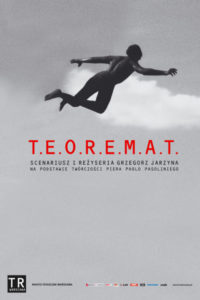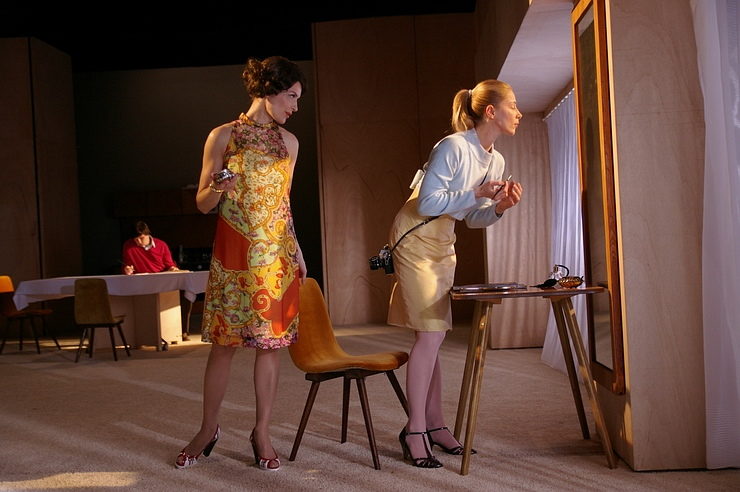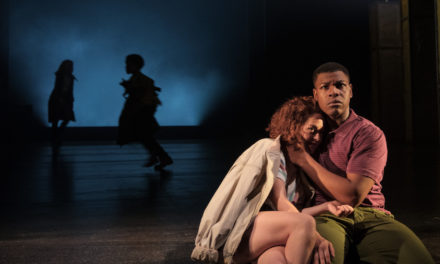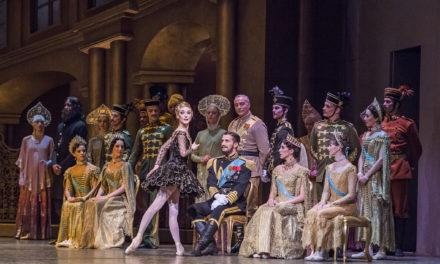Teorema occupies a position of special importance in Pier Paolo Pasolini’s production, both as a novel and film, released in 1968: the story of a young and handsome stranger, a guest of a house in Milan, who seduces all the members of an apparently respectable family, introduces anarchy into the social system, destroying the hypocritical world of the bourgeoisie, seen by Pasolini as a consumer and superficial society.
T.E.O.R.E.M.A.T., a Polish adaptation of Teorema staged in Warsaw in 2009, was created by Grzegorz Jarzyna, probably one of the most prominent theatre contemporary directors and manager of the innovative TR Warsawa theatre since ’98.
 Jarzyna explained his process of adaptation in an interview to Magdalena Podbielkowska and Peter Bisley of a New Zealand newspaper, before the staging of T.E.O.R.E.M.A.T. at the New Zealand International Arts Festival: “In the novel the subject is more developed; especially the religious, mystical aspect, and the ultimate question of our existence and purpose of life” (Podbielkowska, Bisley 2010). The strict relation to the novel has been inadequately considered, as is clear from Philip Fisher’s review on the occasion of the 2010 performance at the Barbican in London: “T.E.O.R.E.M.A.T is a classic example of European theatre in which the director is auteur. Grzegorz Jarzyna from TR Warszawa, who brought 4.48 Psychosis and Dybbuk to Edinburgh and, in the case of the former, the Barbican, has taken a 1968 Pier Paolo Pasolini cult movie, Teorema and made it his own” (Fisher 2010).
Jarzyna explained his process of adaptation in an interview to Magdalena Podbielkowska and Peter Bisley of a New Zealand newspaper, before the staging of T.E.O.R.E.M.A.T. at the New Zealand International Arts Festival: “In the novel the subject is more developed; especially the religious, mystical aspect, and the ultimate question of our existence and purpose of life” (Podbielkowska, Bisley 2010). The strict relation to the novel has been inadequately considered, as is clear from Philip Fisher’s review on the occasion of the 2010 performance at the Barbican in London: “T.E.O.R.E.M.A.T is a classic example of European theatre in which the director is auteur. Grzegorz Jarzyna from TR Warszawa, who brought 4.48 Psychosis and Dybbuk to Edinburgh and, in the case of the former, the Barbican, has taken a 1968 Pier Paolo Pasolini cult movie, Teorema and made it his own” (Fisher 2010).
In his adaptation of Pasolini’s novel, in which the director also inserts other autonomous fragments, Jarzyna seems to have in mind the film, and he makes precise stylistic choices both from the point of view of the script and of the staging. He opts for wireless microphones that create a sound quality almost similar to that obtained by radio, but at the same time he works on silence and silent dialogues with the actors’ bodies to fill the stage with grand movements, body language and proxemics games, creating a mise-en-espace with a high conceptual content: “The text at the end of the play portrays the figure disappearing into space, into desert, into nothing, the same recurring landscape, and touches on the philosophy of emptiness.” (Podbielkowska, Bisley 2010).
The director makes clear his choice to adapt Teorema, and no other Pasolini’s works, considering it a “prophetic depiction of an all-consuming system of consumption” (Podbielkowska, Bisley 2010). It also specifies how a staging of Teorema could have been fully appreciated in Poland only after 1989: “Poland was a totalitarian communist system, and we know what that really means. Pasolini was a utopian and purely ideological communist” (2010).
However, Jarzyna emphasises that the bourgeois capitalist-communist political dialectic was not his main inspiration for adapting the work: “Its rich metaphor and poetry have much larger force than its political message, and are applicable to the smallest cell of society, which is the family, and the relationships between them. This is a problem which touches each of us” (2010). According to him, the stranger who arrives in the house “is neither a symbol of defeat or victory. He is a catalyst that accelerates the inevitable and appropriate response: he triggers these reactions then disappears” (2010). And more: “He is the activator which evokes the truth deep within us. He helps us to look at ourselves without all the constructions of cultural life, to see the hypocritical self” (2010).
The result is an effective and coldly schematic overview on the reactions of family, orchestrated as a mime show: the maid goes back to the country ending her days in a catatonic state sit on a bench; the son of the couple vents his anger by painting abstract works; the daughter is interned in mental hospital; the mother gives herself sexually to a street gang; Paolo strips in the middle of the central station.
References
FISCHER, Philip (2010), “Theatre Review: T.E.O.R.E.M.A.T.” British Theatre Guide.
PODBIELKOWSKA, Magdalena and Peter Bisley (2010), “Primitive, Sacred and Pure: T.E.O.R.E.M.A.T.” The Lumière Reader, 8 March.
This article has been adapted from: ROTONDI, Armando (2014), “After Pasolini’s Teorema: Notes on the Theatre of Grzegorz Jarzyna and Mikołaj Mikołajczyk,” Mise en Abyme. International Journal of Comparative Literature and Arts, Vol. I, Issue 1, January/June, pp. 42-49.
This post was written by the author in their personal capacity.The opinions expressed in this article are the author’s own and do not reflect the view of The Theatre Times, their staff or collaborators.
This post was written by Armando Rotondi.
The views expressed here belong to the author and do not necessarily reflect our views and opinions.


















